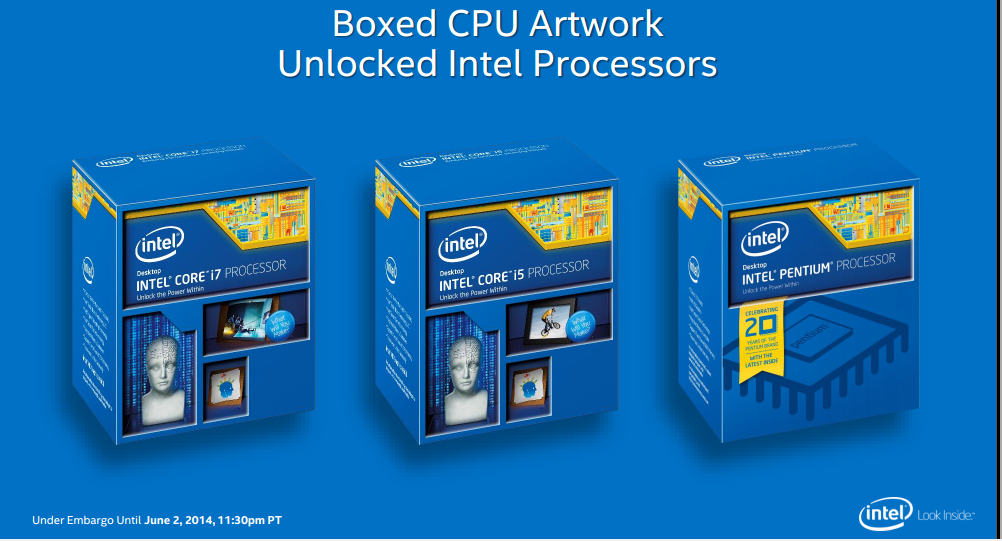Asus Unlocks Overclocking on Non Z-Series Motherboards
UPDATE: Although we suspected that this was the result of an Intel/Asus collaboration, it looks like that is not the case. After reaching out to Asus, we discovered that Intel has nothing to do with this. Instead of the two companies working together, Asus simply found a workaround to make overclocking possible on these platforms. Of course, we don’t know what this workaround is, but that will only make it more interesting to see how other vendors will respond in the coming few days.
Soon you'll be able to overclock your unlocked Intel Haswell or Haswell refresh CPU on a non Z-series motherboard.
Asus has announced that it is releasing new UEFI BIOSes for its H87, H97, B85, and H81 series motherboard that enable support for overclocking. While the company doesn’t guarantee that all of the processors will be overclockable in combination with these motherboards, Asus did indicate that you should be able to overclock the K series Haswell and Haswell Refresh processors, along with the new Pentium Anniversary Edition CPU.
The last CPU is probably the reason why Asus is making this functionality available. The new Pentium Anniversary Edition processor is built to celebrate 20 years of Pentium processors and comes with an unlocked multiplier. This CPU costs about $80, and it’d be a fairly pointless release if the only boards it can be overclocked on are Z-series motherboards. To solve this problem, two things can be done: either the motherboard vendor can build a budget oriented Z-series motherboard, or, as Asus is doing, release a BIOS that unlocks overclocking features. That way, you're not forced to buy an expensive Z-series motherboard to overclock your cheap Pentium Anniversary Edition CPU. Asus probably collaborated with Intel to do this, as it is in Intel's interest to have cheap motherboards available to overclock this CPU, increasing its sales.
To unlock the overclocking features users need to update the BIOS to the most recent version, and drop a CPU into the socket that supports overclocking through an unlocked multiplier. Once this is done the necessary features will automatically become visible in the UEFI BIOS. The overclocking can only be done through adjusting the multiplier, though.
Keep an eye out for a new BIOS for your board if you’re among the interest group, it should either be available already, get posted somewhere in the next few days.
Follow Niels Broekhuijsen @NBroekhuijsen. Follow us @tomshardware, on Facebook and on Google+.
Get Tom's Hardware's best news and in-depth reviews, straight to your inbox.
Niels Broekhuijsen is a Contributing Writer for Tom's Hardware US. He reviews cases, water cooling and pc builds.
-
MANOFKRYPTONAK This is really awesome. Now the unlocked pentium makes even more sense. I can buy it a great board for the price and then I can upgrade to a K unlocked i5 or i7 later. Or I can get a cheap board overclock my pentium and be about on par with an i3 for much cheaper. This is going to make cheap builds so much easier now for people on a really tight budget, while still offering greatly increased performance with many upgrades still available.Reply -
dstarr3 I'd assumed that Asus kept it disabled on non-Z motherboards because the hardware wasn't up to delivering much performance while remaining stable. Even some of the lower-end Z-series motherboards struggle a bit. Or, who knows, maybe that's what Asus initially thought in development, as well, and after some time of research, they decided it's safe after all. Either way, good timing regarding the latest Celeron.Reply -
elbert If Intel has allowed Asus to overclock with the h and b series they've gotten serious about the low end. May be a good time to build a new gaming system on the cheap.Reply -
lunyone This will put the nail in the coffin for cheap AMD builds. AMD will need to come out with something to counter this move by Intel. I'm all for cheap and OC'able systems, but this has put AMD in a tougher position, IMHO.Reply -
wtfxxxgp All I read was "this is great for the consumer" :)Reply
If only Graphics cards can go through something similar next...those prices are truly ridiculous, especially here in sunny South Africa where our Rand is becoming the next Zim-dollar -
jee_are "The overclocking can only be done through adjusting the multiplier, though."Reply
Does that mean you can't adjust the Vcore? That would kind of limit the overclocking potential. -
BleedingEdgeTek My MSI H87-G43 could overclock my 4670k using command center in windows. I always though this was a normal thing lolReply

